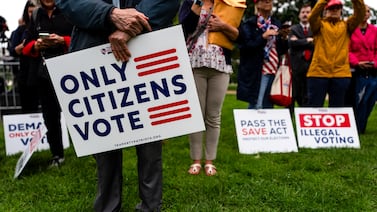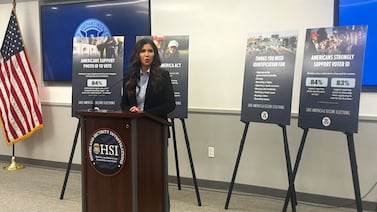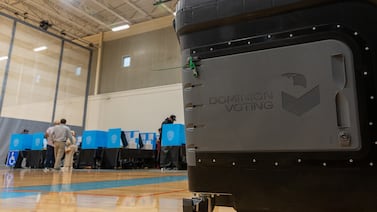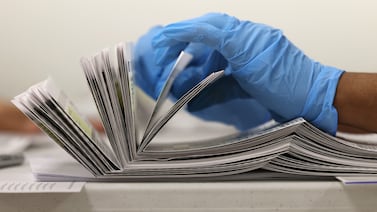Votebeat is a nonprofit news organization reporting on voting access and election administration across the U.S.
This news analysis was originally distributed in Votebeat’s free weekly newsletter. Sign up to get future editions, including the latest reporting from Votebeat bureaus and curated news from other publications, delivered to your inbox every Saturday.
A messy, long-running fight involving one of the country’s most prominent voter registration groups got even messier this month when Vote.org sued its founder, Debra Cleaver, who launched the group in 2008.
The two sides had an acrimonious split in 2019 that has since played out as a noxious stew of allegations, in court and in public.
But the particulars of the dispute matter less than the backdrop against which it’s happening. Nonprofits dedicated to registering voters are now carrying out their work at a time of heightened challenges. Alarming claims about the risk of ineligible voters slipping onto the rolls are fueling distrust of registration drives. States have enacted new laws in recent years to restrict or criminalize aspects of this work.
Meanwhile, one of the field’s most visible groups is burning resources and credibility.
Vote.org is a nonpartisan nonprofit that provides online tools to help people register to vote, check their registration status, and access election information; it has become one of the largest digital platforms for election support in the U.S., serving millions of voters each election cycle.
Vote.org has repeatedly insisted that the fight with Cleaver won’t distract it from its work. But it’s the type of thing that can create confusion for donors, hesitation among partners, and fresh doubts about whether nonprofits can rise to the challenges they face.
Recent research from Democracy Fund (a financial supporter of Votebeat) underscores why this is such a sensitive moment for Vote.org to be in turmoil. According to a survey released earlier this year, nearly 9 in 10 democracy funders say they’re worried about a decline in support for such work, and many believe the philanthropic sector has yet to find strategies that can meaningfully improve U.S. democracy. While large institutional funders mostly plan to maintain or even increase their giving, individual donors are far less certain — exactly the audience most likely to be spooked by headlines about internal dysfunction at a group like Vote.org.
The survey also shows funders are increasingly worried about legal risks and reputational threats to pro-democracy nonprofits, with many now offering flexible funding or legal support to grantees facing such pressures. But even well-resourced groups have little margin for messy, publicized internal disputes. That reality makes the current Vote.org lawsuit a stress test of donor confidence in the sector as a whole.
Research also shows that when nonprofits appear less transparent, donor trust erodes — and with it, perceptions of their performance. Once that confidence is shaken, rebuilding it is slow, if not impossible. In academic parlance (and courtesy of Mark LeClair at Fairfield University), “the cumulative effect of scandals in the charitable sector is a significant reduction in the level of giving.”
Vanessa Avery, lead counsel for Vote.org, said Cleaver’s actions, detailed in the suit, have harmed the organization’s ability to raise money and have left it with no choice but to sue to stop her behavior.
“At a time when voting rights are under unprecedented assault, it’s truly unfortunate that Debra Cleaver has continued to pursue a relentless and defamatory campaign to, in her own words, ‘destroy’ Vote.org,” said Avery, a partner at McCartner & English.
Cleaver declined to comment on the allegations and said she is “certain” that any declining enthusiasm among philanthropies has nothing to do with the ongoing feud. While she said she has noticed that “foundations are less inclined to fund voter registration work,” she attributes this “to fear of reprisal from the Trump administration.”
Either way, when funders pull back, the people left exposed are voters who rely on these groups to expand access and defend participation.
Besides playing a vital role in voter registration, groups like Vote.org fill important gaps in voter education — a responsibility that has grown as new regulatory burdens make it harder for local election offices to provide guidance directly to voters.
And while state and local governments struggle to provide user-friendly ways to check voter registration on your phone or request a mailed ballot without the use of a printer, these groups make apps and run campaigns that make voting easier for millions.
The dispute between Vote.org and Cleaver will ultimately be resolved. But meanwhile, it puts the voting public at risk.
Update, Sept. 30: This story was updated to include comment from Vote.org.
Jessica Huseman is Votebeat’s editorial director and is based in Dallas. Contact Jessica at jhuseman@votebeat.org.




